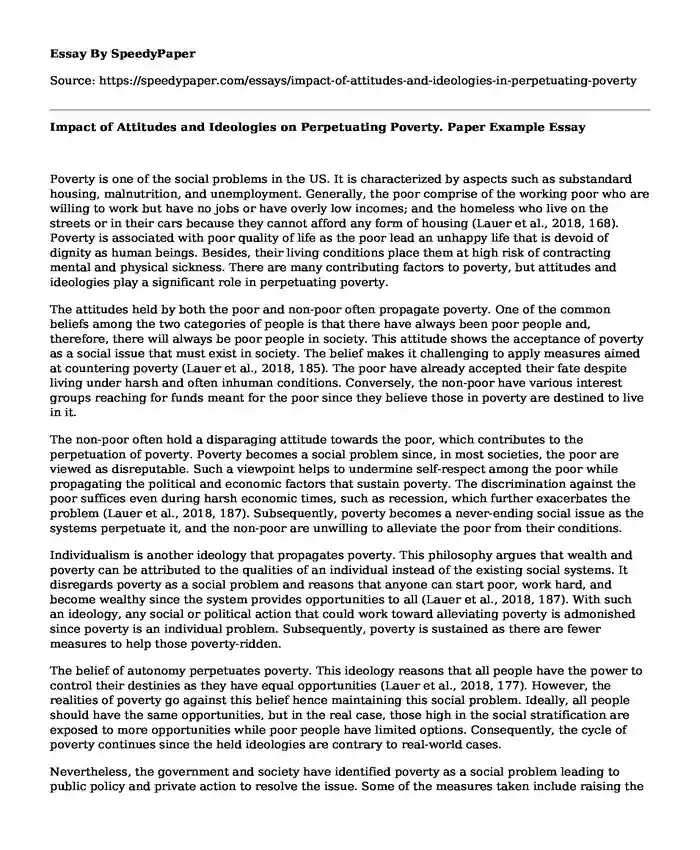
| Type of paper: | Essay |
| Categories: | Population Mental health Public policy Social issue |
| Pages: | 3 |
| Wordcount: | 614 words |
Poverty is one of the social problems in the US. It is characterized by aspects such as substandard housing, malnutrition, and unemployment. Generally, the poor comprise of the working poor who are willing to work but have no jobs or have overly low incomes; and the homeless who live on the streets or in their cars because they cannot afford any form of housing (Lauer et al., 2018, 168). Poverty is associated with poor quality of life as the poor lead an unhappy life that is devoid of dignity as human beings. Besides, their living conditions place them at high risk of contracting mental and physical sickness. There are many contributing factors to poverty, but attitudes and ideologies play a significant role in perpetuating poverty.
The attitudes held by both the poor and non-poor often propagate poverty. One of the common beliefs among the two categories of people is that there have always been poor people and, therefore, there will always be poor people in society. This attitude shows the acceptance of poverty as a social issue that must exist in society. The belief makes it challenging to apply measures aimed at countering poverty (Lauer et al., 2018, 185). The poor have already accepted their fate despite living under harsh and often inhuman conditions. Conversely, the non-poor have various interest groups reaching for funds meant for the poor since they believe those in poverty are destined to live in it.
The non-poor often hold a disparaging attitude towards the poor, which contributes to the perpetuation of poverty. Poverty becomes a social problem since, in most societies, the poor are viewed as disreputable. Such a viewpoint helps to undermine self-respect among the poor while propagating the political and economic factors that sustain poverty. The discrimination against the poor suffices even during harsh economic times, such as recession, which further exacerbates the problem (Lauer et al., 2018, 187). Subsequently, poverty becomes a never-ending social issue as the systems perpetuate it, and the non-poor are unwilling to alleviate the poor from their conditions.
Individualism is another ideology that propagates poverty. This philosophy argues that wealth and poverty can be attributed to the qualities of an individual instead of the existing social systems. It disregards poverty as a social problem and reasons that anyone can start poor, work hard, and become wealthy since the system provides opportunities to all (Lauer et al., 2018, 187). With such an ideology, any social or political action that could work toward alleviating poverty is admonished since poverty is an individual problem. Subsequently, poverty is sustained as there are fewer measures to help those poverty-ridden.
The belief of autonomy perpetuates poverty. This ideology reasons that all people have the power to control their destinies as they have equal opportunities (Lauer et al., 2018, 177). However, the realities of poverty go against this belief hence maintaining this social problem. Ideally, all people should have the same opportunities, but in the real case, those high in the social stratification are exposed to more opportunities while poor people have limited options. Consequently, the cycle of poverty continues since the held ideologies are contrary to real-world cases.
Nevertheless, the government and society have identified poverty as a social problem leading to public policy and private action to resolve the issue. Some of the measures taken include raising the minimum wage, implementation of welfare antipoverty programs, and prioritizing single mothers since they are the most poverty-ridden group (Lauer et al., 2018, 189). Although such programs are facing several challenges, their effective execution would help alleviate poverty, hence countering a prevalent social problem.
Reference
Lauer, Lauer, J. L., & Lauer, J. C. (2018). Social problems and the quality of life (14th Ed.). McGraw Hill.
Cite this page
Impact of Attitudes and Ideologies on Perpetuating Poverty. Paper Example. (2023, Aug 15). Retrieved from https://speedypaper.com/essays/impact-of-attitudes-and-ideologies-in-perpetuating-poverty
Request Removal
If you are the original author of this essay and no longer wish to have it published on the SpeedyPaper website, please click below to request its removal:
- Free Essay Example on Gender and Feminist Theory
- Essay Sample on the US-China Conflict Resolution
- 13th Amendment of the Constitution
- Essay Sample - Overview of Positive Strengths
- Essay Sample on Theology and Civil Rights
- Essay Sample on The Facade of the American Dream
- Nursing: Essential to Healthcare Sector, Valuable Role in Comfort Provision - Essay Sample
Popular categories




